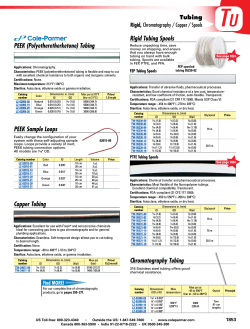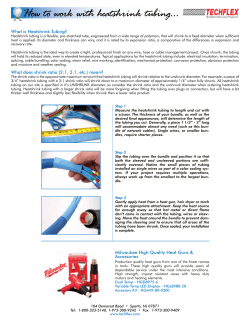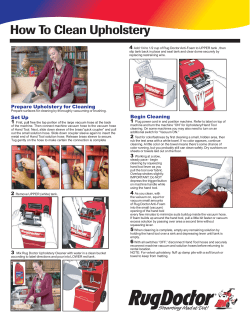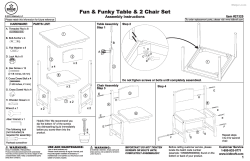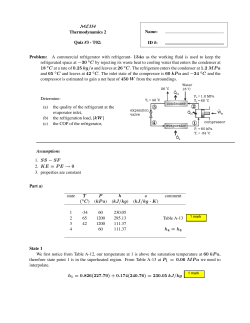
Section 2 Safety, Tools and Equipment, Shop Practices
Section 2 Safety, Tools and Equipment, Shop Practices Unit 5 Tools and Equipment Unit Objectives After studying this chapter, you should be able to: • Describe hand tools used by the air-conditioning, heating, and refrigeration technician. • Describe equipment used to install and service air conditioning, heating, and refrigeration systems. General Hand Tools (1 of 6) •Screwdrivers – Straight-slot screwdrivers turn screws with straight slots. – Phillips head screwdrivers turn screws with slots resembling a cross. General Hand Tools (2 of 6) • Wrenches – Common types of wrenches include the open end wrench, the box wrench, and the combination wrench. General Hand Tools (3 of 6) Other wrenches include pipe wrenches and adjustable wrenches. General Hand Tools (4 of 6) • Hex keys – Used to turn screws and set screws that have female hex heads – Also referred to as Allen wrenches General Hand Tools (5 of 6) • Pliers – Types of pliers include… Needlenose Pump pliers Linesman Locking pliers Slip joint pliers General Hand Tools (6 of 6) • Hammers – Commonly used hammers include… Ball peen Carpenter’s claw Always be careful when using hammers! Rubber mallet Specialized Hand Tools • Stock and dies – The die is used to cut threads on the external surface of piping material. – The die fits and locks into the stock during the threading process. – The stock is used to facilitate the threading process. Electric Drills • Can be corded or battery operated • Some drills variable speed • Some types reversible • Always disconnect power cord (corded drills) when changing the drill bit. Specialized Tools (1 of 4) • Nut drivers – Used to drive hex head screws – Have a socket head – Come in a variety of styles Specialized Tools (2 of 4) • Refrigeration service wrench – Ratcheting wrench used to turn square stems on fuel tanks, service valves, and other system components – Can be used on four different stem sizes Specialized Tools (3 of 4) • Crimping tool – Cuts Wire – Strips wire – Crimps solderless connectors onto wires – Cuts small bolts Specialized Tools • Inspection mirror – Telescopic mirror used to inspect solder joints for leaks Tubing Tools (1 of 4) • Tubing cutter – Available in different sizes and styles – Used to cut copper and aluminum tubing and piping materials Tubing Tools (2 of 4) • The flaring block and yoke are used to create flares in soft drawn tubing. Before the flare After the flare Tubing Tools (3 of 4) • Swaging tools – Used to expand the end of a tube so that two sections of the same size tubing can be joined – Used in conjunction with a flaring block Tubing Tools • Tubing benders – Can be spring type or lever type – Used to bend soft copper or aluminum tubing Specialized Service Tools (1 of 5) • The gage manifold – One of the HVAC/R technician’s most important pieces of equipment – Can read pressures on both the high- and low-pressure sides of the system – Can read pressures below atmospheric on the low-pressure side of the system – Can be of the two-valve or four-valve variety LOW SIDE GAUGE HIGH SIDE GAUGE HIGH SIDE VALVE LOW SIDE VALVE MANIFOLD LOW SIDE HOSE HIGH SIDE HOSE CENTER HOSE Specialized Service Tools (2 of 5) • The U-tube manometer – Can be the mercury or water variety – Can measure low pressures in inches of water column or millimeters of mercury • The liquid level rises on one side and falls on the other. • The difference between the two liquid levels is the pressure reading. Open to atmosphere 1.75” 0” 1.75” The pressure reading on this manometer is 3.5 inches of water column. To a natural gas valve, for example Specialized Service Tools (3 of 5) • Electronic vacuum gage – Measures the vacuum in a refrigeration system during the evacuation process – Can measure a vacuum down to 50 microns or 0.050 mm Hg • 1,000 microns = 1 mm Hg – As a vacuum is pulled on a system the micron level will drop. Specialized Service Tools (4 of 5) • Electronic vacuum gage Power indicator Very poor vacuum Fair vacuum Good vacuum Hose from vacuum pump Cap Specialized Service Tools (5 of 5) • Vacuum pump – Designed to remove air and non-condensable gases from an airconditioning or refrigeration system Refrigerant Leak Detectors (1 of 2) • Halide leak detector – It is used with acetylene, propane, or MAPP gas. – When ignited, the flame heats a copper disc. – Combustion air is drawn through a tube. – The open end of the tube is passed over fitting or piping. – When a leak is detected, the flame will change color (from blue to green). Refrigerant Leak Detectors (2 of 2) • When a leak is detected, the flame color changes. Other Refrigerant Leak Detectors • • • Electronic leak detectors – Contain refrigerant-sensitive elements – Reacts to leaks with rapid beeping Ultraviolet leak detectors – UV additive introduced to the system – Pipes will glow at the point of the leak Ultrasonic leak detectors – Detect the sound of escaping refrigerant The Clamp-on Ammeter (1 of 2) • It is used to measure current flow in an electric circuit. • The jaws of the meter are clamped around one conductor of the circuit. • The meter can also be used to measure voltage and resistance. Volt-ohm-milliammeter (VOM) • • • • Often referred to as a multimeter Measures volts, ohms, and amps Can be analog or digital styles Come with a number of features, options, and accessories Unit Summary • Air conditioning, heating, and refrigeration technicians should be familiar with available hand tools and equipment. • Always use tools and equipment properly. • Only use tools for the jobs for which they were intended. • Improper tool usage can result in personal injury.
© Copyright 2025




